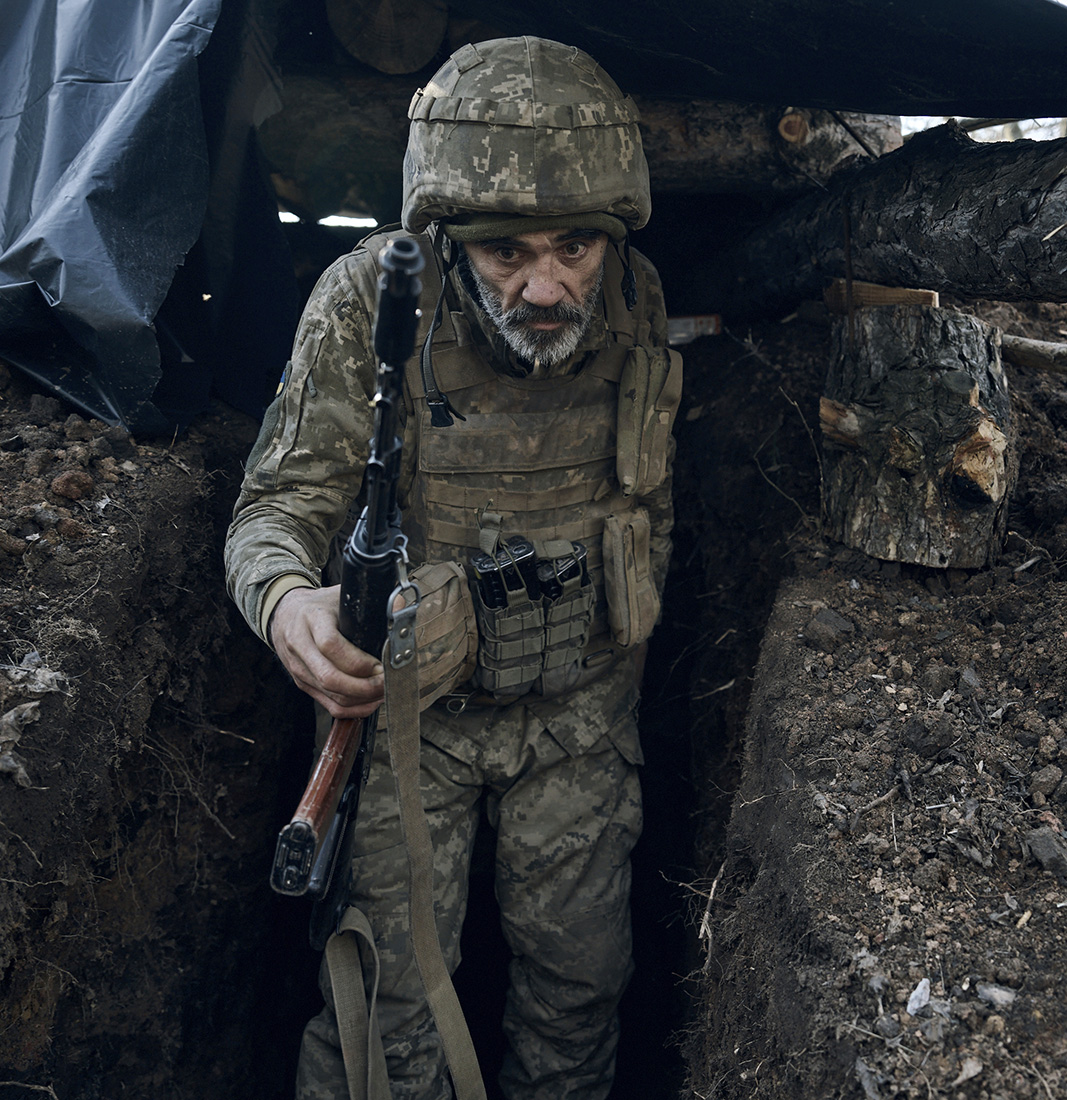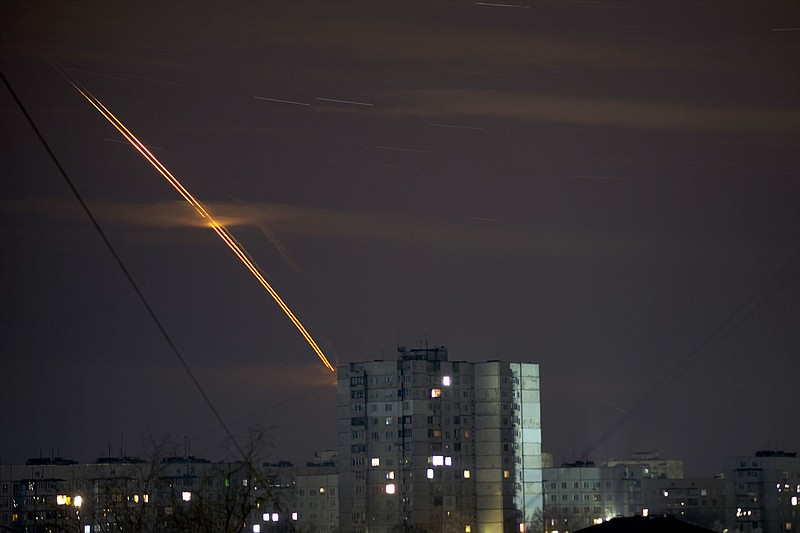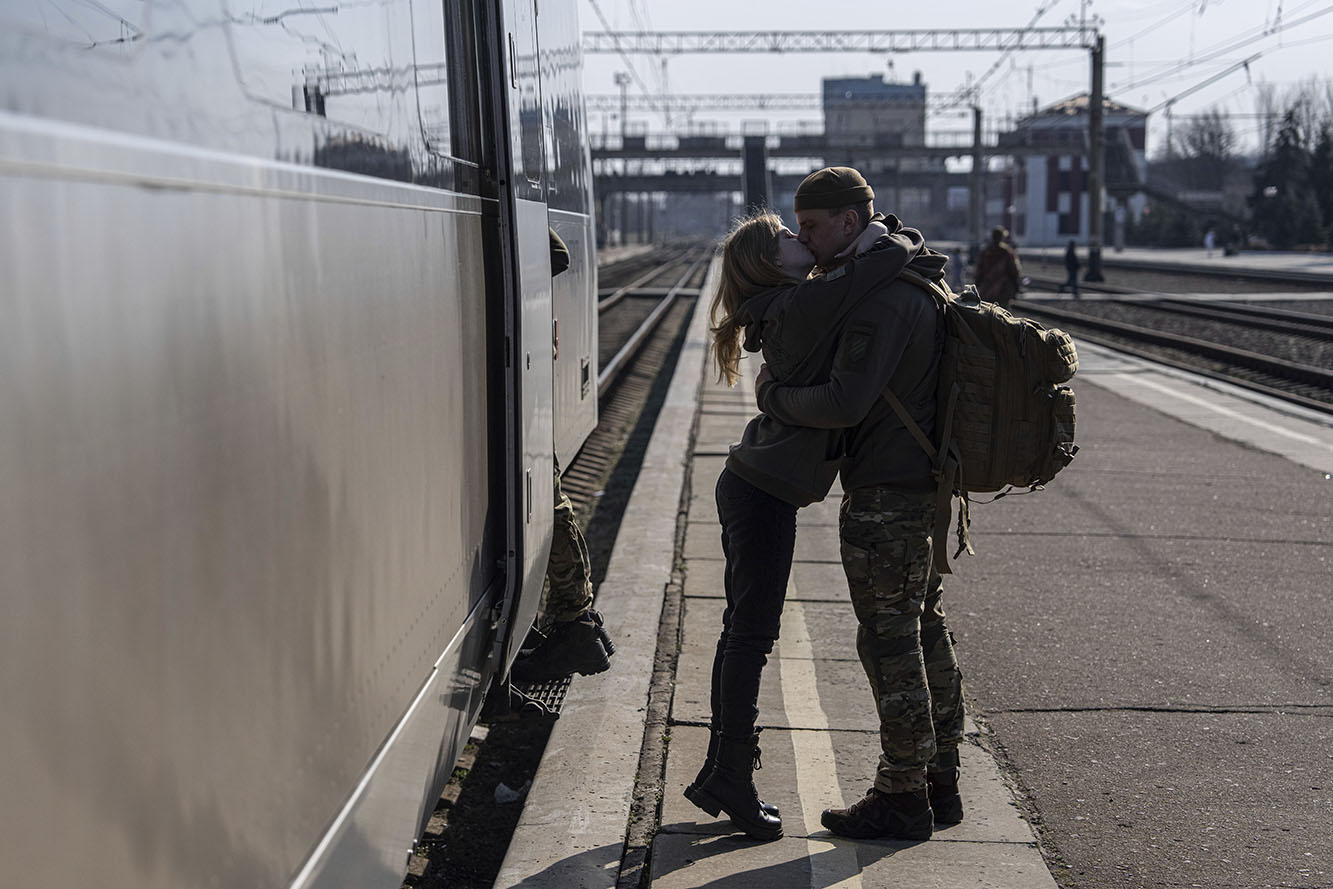KYIV, Ukraine -- Long-range Russian bombardment killed at least 10 civilians and wounded 20 others in several parts of Ukraine on Friday, officials in Kyiv said, as a Kremlin official boasted that its forces were prepared to repel an expected Ukrainian counteroffensive this spring.
Five people died in Kostiantynivka, in eastern Ukraine's Donetsk province, when a Russian missile hit an aid station. Ukrainian authorities last year established hundreds of "points of invincibility," where residents hard-pressed by the war could warm up, recharge their cellphones and get food.
Prosecutors said the Russians attacked with S-300 anti-aircraft missiles. The civilians who died were refugees, according to Donetsk Gov. Pavlo Kyrylenko.
As the mostly artillery war of the winter months stretches into its second spring, Russian forces also used air-launched missiles, exploding drones and gliding bombs to attack several regions, Ukrainian air force spokesman Yurii Ihnat said.
Digging in for a long fight, the Kremlin is seeking to sign up as many as 400,000 contract soldiers this year to replenish its ranks, according to people familiar with the planning who spoke on condition of anonymity to discuss matters that aren't public.
The ambitious recruiting campaign would allow the Kremlin to avoid another forced mobilization of reservists as it ramps up the campaign to reelect President Vladimir Putin later this year, the people said. Last fall's call-up shook public confidence and triggered an exodus of as many as 1 million Russians from the country.
Even with the battlefield and political challenges, Putin has signaled he's confident Russia will be able to outlast Ukraine's supporters in the U.S. and Europe, betting that if his forces are able to prevent another breakthrough by Ukrainian troops in the coming months, backing for Kyiv will weaken.
While many in the government and Kremlin elite question whether Russia can ever prevail, hardline security-service officials are committed to pursuing a fight they see as existential and have Putin's ear, the people said.
Defying efforts by Washington and its allies to isolate him, Putin won strong public backing this month from Chinese President Xi Jinping, who pledged to tighten ties on a visit to Moscow. Privately, Kremlin officials were upbeat about the visit despite the lack of deals announced, saying Xi's high-profile endorsement was an important sign of support.
China hasn't publicly committed to supply lethal aid, even as Russia's forces have struggled to advance in the face of fierce Ukrainian resistance. Nearly all of the 300,000 troops mobilized in the fall are now on the battlefield, according to Ukrainian and western officials, but Russia hasn't managed to take any major towns in recent months.
MEDVEDEV'S WARNING
Two civilians were killed and nine were wounded in the town of Bilopillia in Sumy province by an overnight rocket and artillery barrage and airstrikes, officials in the northeastern region said.
In southern Ukraine, Russian shelling killed one person in the city of Kherson and killed another person and wounded four others in the town of Bilozerka. President Volodymyr Zelenskyy visited that region Thursday.
Ukrainian forces are poised to use the arrival of warmer weather and new weapons from the West, including tanks, for a counteroffensive aimed at dislodging Russian troops from occupied areas.
But Dmitry Medvedev, Russia's former president and now deputy head of the country's Security Council chaired by Putin, said its forces were ready to repel a counterattack.
"Our General Staff is assessing all that," Medvedev said.
He added that any Ukrainian attempt to seize Crimea, which Russia illegally annexed in 2014, could trigger a nuclear response from Moscow.
"An attempt to split part of the state away means an encroachment at the very existence of the state," he said. "Quite obviously, it warrants the use of any weapons. I hope our 'friends' across the ocean realize that."
Medvedev's warning also stems from Russia's security doctrine envisioning the use of its atomic arsenal in response to a nuclear attack or one with conventional weapons that threatens "the very existence of the Russian state."
Medvedev also said that Western experts operating weapons, such as the U.S.-made Patriot air defense missile systems supplied to Ukraine, could be targeted. Ukrainian soldiers have received training in the U.S., although Russian officials frequently claim that foreign instructors are in Ukraine.
"If Patriot or other weapons are delivered to the territory of Ukraine along with foreign experts, they certainly make legitimate targets, which must be destroyed," Medvedev said in video posted to his messaging app channel. "They are combatants, they are the enemies of our state and they must be destroyed."
"They must understand that as soon as an American or a Polish soldier shows up there, he must be killed," he added.
The Kremlin wants to create a "sanitary cordon" of up to 60 miles around Russian-held areas so short- and medium-range weapons can't hit them, Medvedev said.
Moscow may even try to grab a chunk of Ukrainian territory stretching all the way to Polish border, he said.
Also Friday, Kremlin spokesman Dmitry Peskov welcomed Denmark's plans to invite the operator of the Nord Stream 2 gas pipelines to join a mission to recover an object discovered near the pipeline damaged in an explosion in September. There is still no accepted explanation for the sabotage on the Russia-to-Germany pipelines.
"This investigation should be transparent and inclusive from the standpoint of involvement of all parties concerned," he said, adding that the object was located near a pipe weld, the most vulnerable section of a pipeline on the Baltic seabed.
POW KILLINGS
U.N. human-rights monitors have documented dozens of summary killings of Ukrainian and Russian prisoners of war, as well as other possible war crimes such as the use of torture, human shields and other abuses against POWs since Russia invaded its neighbor, according to a report released Friday.
The first full look by the U.N. human-rights office's mission in Ukraine at the treatment of POWs was released along with an update of human-rights violations overall from a six-month period that ran through January. The report was based on interviews with about 400 POWs -- half Ukrainians who had been released and the other half Russians held captive in Ukraine.
The team said it had no access to POWs held in Russia or in Russia-occupied parts of Ukraine where it identified 48 internment sites. The mission said it nonetheless documented some 40 summary executions over the course of the 13-month war.
The U.N. rights office, which has had a monitoring team in Ukraine since fighting broke out in areas of eastern Ukraine claimed by Russia-backed separatists in 2014, has said its findings are based on confirmed cases and typically understate actual tolls.
Information for this article was contributed by Karl Ritter, Jamey Keaten and Lori Hinnant of The Associated Press and by staff members of Bloomberg News (TNS).
 A Ukrainian soldier leaves a bunker on the front lines Friday during a battle with Russian troops near Bakhmut, in the Donetsk province of eastern Ukraine. Russia unleashed long-range missiles and drones Friday on several parts of Ukraine, with at least five people killed in the Donetsk region. Meanwhile, the Kremlin reportedly is looking to hire as many as 400,000 contract soldiers to replenish its force in Ukraine. (AP/Libkos)
A Ukrainian soldier leaves a bunker on the front lines Friday during a battle with Russian troops near Bakhmut, in the Donetsk province of eastern Ukraine. Russia unleashed long-range missiles and drones Friday on several parts of Ukraine, with at least five people killed in the Donetsk region. Meanwhile, the Kremlin reportedly is looking to hire as many as 400,000 contract soldiers to replenish its force in Ukraine. (AP/Libkos)
